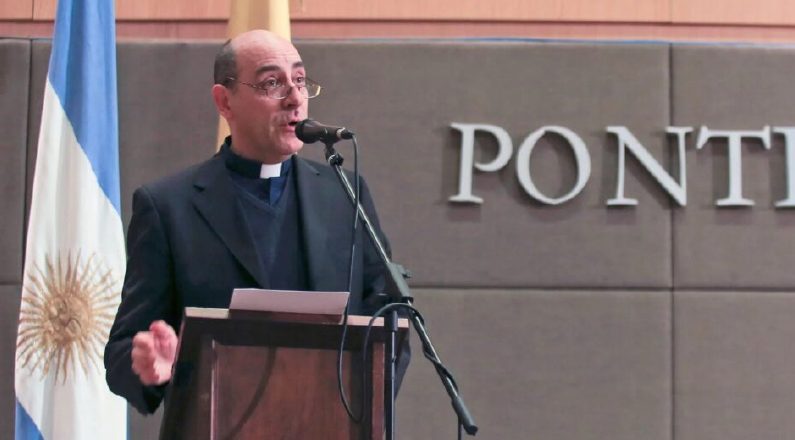
Mission
Monsignor Victor Manuel Fernández, Prefect of the Dicastery of Faith Photo: ADN Celam
Vatican Seeks to Define ‘Spiritual Abuse’ in Canon Law
(ZENIT News / Rome, 01.31.2025).- The Vatican’s Dicastery for the Doctrine of the Faith is moving to address a troubling gap in Canon Law: the lack of explicit provisions against «spiritual manipulation and abuse of power» used in cases of sexual coercion.
In an interview with the Spanish Catholic newspaper Alfa y Omega, Cardinal Víctor Manuel Fernández, the prefect of the dicastery, acknowledged the urgent need for a clearer legal definition of spiritual abuse—a phenomenon that, he admitted, is not uncommon within the Church.
“We have frequently received reports of situations where spiritual elements are misused as a pretext for sexual relationships,” Cardinal Fernández stated. “It involves the manipulation of both the people who entrust themselves to a spiritual guide and the beauty of our faith itself, distorted for personal gain.”
A Issue in Need of Legal Reform
At present, the only applicable provision in Canon Law is Canon 1399, a general clause allowing for punishment of offenses not explicitly defined in Church law when the gravity of the violation demands it. However, Cardinal Fernández argues that relying on such a broad law is insufficient when a crime becomes widespread.
“When a serious offense is frequently committed, it is not advisable to depend on such a general canon, especially when imposing severe penalties,” he said.
To address this, the Vatican announced in November 2024 that Pope Francis had authorized the formation of a working group in collaboration with the Dicastery for Legislative Texts. This group, led by Archbishop Filippo Iannone, will explore ways to define spiritual abuse within Canon Law and establish clear guidelines for prosecution and punishment.
The Challenge of Defining Spiritual Abuse
One of the complexities in drafting new legislation is establishing precise definitions that distinguish serious offenses from less severe forms of misconduct. Cardinal Fernández warned that a vague definition could lead to overreach, fostering an environment of excessive suspicion or a “cancel culture” within the Church.
“If everything is treated with the same level of severity, we risk failing to properly punish the gravest cases while simultaneously creating unnecessary fear,” he explained.
Among the most egregious cases, he emphasized, are instances where clerics justify sexual acts under the guise of deepening a person’s relationship with God—sometimes even in sacred spaces. He stated that such acts should warrant the highest penalties possible under Canon Law.
Rupnik Scandal and the Push for Reform
The Vatican’s renewed attention to spiritual abuse follows the highly publicized case of ex-Jesuit priest and artist Marko Rupnik, who was accused of spiritual and sexual abuse spanning decades. Rupnik allegedly manipulated female victims into engaging in sexual acts under the pretense of religious devotion. His case, currently under Vatican investigation, highlighted the Church’s inadequate legal tools for handling such offenses.
However, Cardinal Fernández clarified that the working group’s proposals are not solely a reaction to the Rupnik case but part of a broader effort to ensure justice and prevent future abuses.
“If we tailor laws around a single case, we compromise the objectivity of the work,” he said.
A Step Toward Accountability
One of the group’s key tasks will be to determine whether a completely new category of crime should be introduced into Canon Law or if existing laws should be amended to explicitly include spiritual abuse. Currently, cases are often categorized under “false mysticism”, a term that can also apply to theological errors rather than criminal offenses.
Fernández emphasized that precision in legal terminology is crucial to ensuring justice.
“Canonists need a clear legal definition—perhaps ‘spiritual abuse’—so that we are not always forced to use Canon 1399, which is too broad, or rely on ambiguous terms like ‘false mysticism,’ which can lead to confusion.”
What Comes Next?
The Vatican’s legal experts are now working on concrete legislative proposals, which could lead to new provisions in Canon Law within the coming years. If approved, the reforms would mark a historic shift in the Church’s handling of spiritual abuse, reinforcing its commitment to protecting the faithful from clerical manipulation and coercion.
Thank you for reading our content. If you would like to receive ZENIT’s daily e-mail news, you can subscribe for free through this link.
View all articles
If you liked this article, support ZENIT now with a donation
Pope’s General Audience, January 29, 2025 on the annunciation to Joseph
A Mission of Unity: Cardinal Gugerotti’s Journey to Syria as Pope Francis’ Envoy
